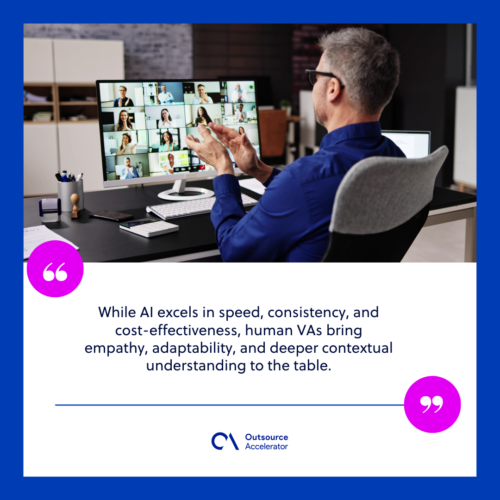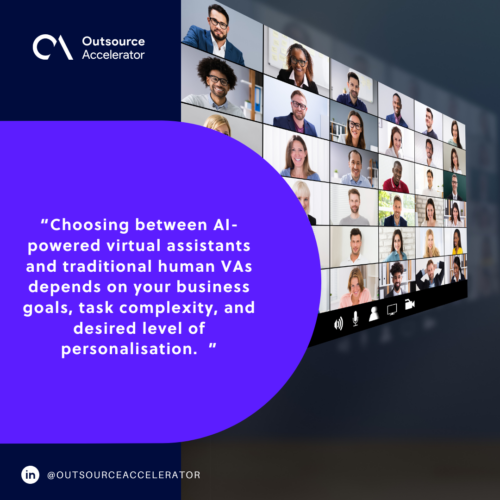AI-powered virtual assistants vs. Traditional human VAs

As technology advances at a rapid pace, businesses now have more options than ever to tap into remote support and boost productivity.
Virtual assistance has become a vital part of modern operations as they are able to handle key tasks from managing schedules to handling customer queries.
Today, companies can choose between traditional human VAs and a new wave of intelligent, AI-powered virtual assistants.
In this article, we’ll explore how these two solutions compare in terms of efficiency, flexibility, cost, and overall performance to help decision-makers understand which option aligns best with their goals. We’ll also touch on how Acquire Intelligence uses AI to streamline workflows and automate essential processes.
Whether you’re looking to automate repetitive tasks or add a personal touch to client interactions, knowing the difference matters.
Dive in to discover how human expertise stacks up against machine intelligence in the evolving world of virtual assistance.
AI-powered virtual assistants vs. Traditional human VAs: Key differences
Digital transformation has permeated the industry. Gartner noted that 91% of companies are involved in some manner of digital initiative.
As the demand for virtual support grows, many growing organizations face a crucial decision: hire a traditional human VA or integrate an AI-powered virtual assistant?
Both offer unique benefits, but their capabilities, costs, and flexibility differ in meaningful ways. Having a deeper knowledge of these differences helps teams make smarter, more scalable choices.
Here’s a quick comparison to highlight the primary distinctions:
| Category | AI-Powered Virtual Assistants | Traditional Human VAs |
| Speed & availability | Operates 24/7, responds instantly, no downtime | Works set hours, may have delays or need breaks |
| Cost | Low ongoing costs, no salary or benefits required | Involves hourly rates, contracts, and overhead |
| Scalability | Easily scales to manage large volumes of tasks simultaneously | Scaling requires hiring and onboarding more staff |
| Task type | Best for repetitive, rule-based tasks like scheduling or data entry | Ideal for complex, nuanced tasks needing judgment |
| Learning curve | Learns from data, improves over time through machine learning | Learns through training, experience, and feedback |
| Personal touch | Limited emotional intelligence, lacks human empathy | Capable of building real relationships and trust |
While AI excels in speed, consistency, and cost-effectiveness, human VAs bring empathy, adaptability, and deeper contextual understanding to the table. The right choice depends on the task at hand, the team’s goals, and the overall operations.
In the next section, explore how Acquire Intelligence’s AI-powered virtual assistants combine smart automation with practical functionality, providing firms a powerful way to streamline workflows and enhance productivity.

A look into Acquire Intelligence’s AI-powered virtual assistants
Acquire Intelligence is redefining how businesses harness automation through its innovative AI-powered virtual assistants. Built for speed, scale, and smart execution, these solutions don’t just complete tasks; they transform how teams operate.
At the heart of Acquire Intelligence is a simple philosophy: automate with intent, implement with confidence.
Their AI-powered virtual assistants are designed to handle everything from routine tasks to complex workflows, so companies reduce manual effort, increase accuracy, and unlock measurable value—fast.
Here’s how Acquire Intelligence delivers its edge:
- Strategic execution. The process starts by identifying gaps and inefficiencies, then mapping workflows and building ROI-backed business cases.
- Custom AI solutions. AI solutions are tailored to your specific needs, from simple automation to multi-step AI agents, with no one-size-fits-all approach.
- Global talent network. Distributed teams across Australia, the Dominican Republic, India, the Philippines, and the U.S. allow for around-the-clock support and optimised costs.
- Rapid deployment. Fast rollouts, modular builds, and phased pilots let you scale efficiently without sacrificing quality.
- Enterprise-grade security. Infrastructure is secure by default, meeting ISO, SOC 2, HIPAA, and GDPR standards.
- Tech-agnostic flexibility. No platform bias, just the right tools for your unique situation.
Acquire Intelligence doesn’t just plug in AI and walk away. Its team continually monitors, optimises, and reallocates workflows to maximise performance and drive long-term success.
One standout example of this impact comes from a collaboration with a leading mobile service provider. Acquire Intelligence launched an AI-powered virtual assistant fully integrated into the provider’s CRM, leading to a 74% reduction in chat volumes and a 25% cut in live support hours.
This smart deployment not only improved response times but also reduced operational costs, highlighting the real-world value of AI-driven automation.
AI-powered virtual assistants vs. Traditional human VAs: Which suits your business needs?
Choosing between AI-powered virtual assistants and traditional human VAs depends on your business goals, task complexity, and desired level of personalisation.
AI excels in speed, scalability, and cost efficiency, while human VAs offer emotional intelligence and nuanced support. The forward-thinking teams often use both, automating repetitive tasks and reserving human input for high-value interactions.
- Want faster workflows? AI can handle that.
- Need a personal touch? Human support still leads.
- Looking to scale smartly? A hybrid model delivers the best of both worlds.
Let Acquire Intelligence help you build the perfect virtual assistant strategy. Contact the Acquire Intelligence team today to get started!








 Independent
Independent




